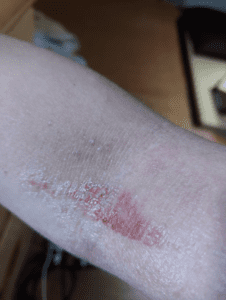Yen-Hsiang Wang
Taipei, Taiwan

I am one of the ten to twenty percent of people in the world with atopic dermatitis. Allergies to environmental factors such as dust mites and certain foods contribute to this condition. Immune function is also an important factor, as evidenced by immunoglobulin E (IgE) and increased eosinophilic leukocytes in the blood. People with atopic dermatitis often have red rashes or scratches; therefore, we sometimes call ourselves “Rose Boy” or “Rose Girl.”
In addition to physical pain, there are also psychological pressures that go along with this condition. In public places, if eczema is on an exposed part of my body, I will feel anxiety, depression, and an inferiority complex. I am afraid that my skin condition will color the way that others see me. That same anxiety often causes skin conditions to worsen.1,2 Therefore, paying attention to a person’s psychological state is of great help in treating the physical condition.
Stigmatization is another difficult part of having a skin condition. Atopic dermatitis is not a contagious disease, but many people do not understand that. Stigma causes additional psychological stress and can make the atopic dermatitis worse. People do not need to be afraid when they see someone with atopic dermatitis.
It can also be stressful to be a caregiver for someone with atopic dermatitis. However, sometimes excessive emotional reactions from caregivers can cause more stress for the patient. My own parents often feel anxious or worried because of my skin condition, which can actually become a psychological burden for me as well. And when I have psychological pressure, it worsens my skin condition. A more relaxed attitude among caregivers may be more helpful to a person with atopic dermatitis.
It is my hope that everyone can learn more about atopic dermatitis to prevent the stigma that accompanies this condition. This would reduce the pressure on both patients and caregivers, and would even allow those of us with atopic dermatitis to control it better.
References
- Sanders KM, Akiyama T. The vicious cycle of itch and anxiety. Neurosci Biobehav Rev. 2018 Apr;87:17-26.
- Aihara M, Hariya T, Ichikawa H, Ikezawa Z. [A case of atopic dermatitis which showed correlation of psychological state and lesions–changes of value of psychological test, skin lesion and NK cell activity]. Arerugi. 2000 Jun;49(6):487-94.
YEN-HSIANG WANG is a medical student in Taiwan, and he is also a patient who was born with atopic dermatitis. Because he wants to explore the treatment of atopic dermatitis and further understand this disease, he has searched many related studies. He hopes this article can help patients with atopic dermatitis control their condition and make more people understand this disease.

Leave a Reply